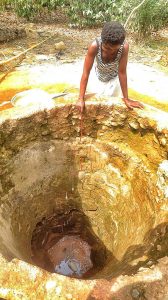This project is made possible through the partnership of Water Charity and the National Peace Corps Association. ![]()
Location
Boti, Eastern Region, Ghana
Community Description
Boti is a community of just under one thousand people, though it’s easy to learn most of their names. The tight-knit community revolves around personal interactions of meal times or a calabash of palm wine. Boti parallels a two-mile stretch of the Pompom River that eventually is the source of the Boti Falls tourist attraction a few miles downstream. The beauty of the green lush jungles is breathtaking. Four months of the year, however, dry season comes and the Pompom turns to sand, and the jungle browns and decays.
The Town is the epicenter for the communities around it, hosting a primary school, junior high school, and clinic for up to six surrounding villages. Many people come to Boti for its resources; however, access to clean water is not one of Boti’s strengths, with only one borehole for its residents.
Problem Addressed
Four months of the year, the problem is comparatively small. The biggest issue that faces residents of Boti in the rainy season is pollution and contaminated water. When the Pompom flows most of the village gets its water from the river. However all along the river as well as upstream, people washcloths, wash, and often, pollute their river with trash and human waste. Even when the river is roaring, there isn’t a safe drop to drink.
In the dry season, there is virtually no water around. The single borehole has long lines and often has to be left to sit to recharge before more water can be taken. The water once taken from the Pompom for all the activities that don’t involve drinking becomes unavailable.
Community health and hygiene are affected. The schools and clinics suffer particularly in the dry season as the water is needed for patients and students, and often things as simple as hand washing are ignored to conserve the water to drink.
 Project Description
Project Description
This project is to build a borehole near the primary school in Boti.
The location is in the center of a heavily-populated part of town and will provide access to water for all the students in the primary school. The project will be constructed using the most up-to-date borehole and pump technology available in Ghana. The majority of the funds will be provided to the contractor for the classes, pipe assembly, and actual digging.
The community will donate skilled labor to building a concrete apron around the borehole to ensure the cleanliness of the area and longevity of the borehole.
Project Impact
This project will benefit at least 300 people.
Peace Corps Volunteer Directing Project
Topher Mongeon
Monitoring and Maintenance
The water sanitation committee will monitor the construction of the borehole done by the contractor. They will help manage the process and funds, seeking assistance as needed from PC volunteers and staff. At the end of the construction, the water sanitation committee will attend basic maintenance classes to ensure the longevity of the borehole.
Comments
The community organization involved in this project is the Boti Water Sanitation Committee.
In the Boti community, much like most communities in Ghana, men never fetch water. Although they drink it, bathe with it, wear clean clothes and eat fufu and stew (the national cuisine), men never fetch water. It’s a woman’s role.
And of the women, it’s usually females of a student’s age that are fetching water. Often times those that are older are pregnant, watching children or simply an elder. However, it is female students that carry most of the water for the community. When the school is out of the water the teacher sends the girls out of class to let girls fetch. When they arrive home, rather than homework, the families will have girls fetch. A borehole will decrease time and energy devoted to fetching water and allow girls to remain in school
PCVs live in their communities for two years. They get to know the people, the culture and the struggle. they eat like Ghanaians, travel like Ghanaians, sweat like Ghanaians, but they don’t suffer like Ghanaians. Peace Corps won’t let them live without clean drinking water, but the kids, the elderly, the crooked backed farmers live without clean water, sometimes without water at all. Kids look at pure water sachets (Ghana’s version of bottled water) like candy or a treat, because of the rarity it is that they may be guaranteed clean water.
Topher states, “I joined PC to realize some of the struggles the global communities have, but to also alleviate that suffering if possible.”
This borehole will help students learn more in school by staying healthy and not fetching water during class times. It’ll keep breastfeeding mothers healthier, it’ll give women more time to spend with their children or working on small income-generating activities. It can increase small animal husbandry and micro gardens filled with veggies that families can’t afford in the dry season. It’s incredible, when you think about it, how valuable one drop of water is.
This project has been made possible through the generosity of an anonymous donor.
Please use the donate button below so that we will have funds on hand for more great upcoming projects in Ghana.
